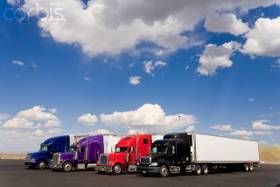JB Hunt?
Topic 2318 | Page 1

I had actually researched JB and considered going to them. They offered .48 cpm which is really good. The only problem is where I live. The position was strictly dry van OTR , out 12 weeks, in one week and $800 for the week I was home. No way my wife would be cool with that.
On another note, JB Hunt is by far the LARGEST intermodal carrier in the United States and a good portion of freight is starting to move that way. Every other company is now realizing this but they are way behind JB when it comes to intermodal.
IMO, getting on with JB Hunt is an excellent career move if you can find a position that fits you and your goals.
OTR:
Over The Road
OTR driving normally means you'll be hauling freight to various customers throughout your company's hauling region. It often entails being gone from home for two to three weeks at a time.
Intermodal:
Transporting freight using two or more transportation modes. An example would be freight that is moved by truck from the shipper's dock to the rail yard, then placed on a train to the next rail yard, and finally returned to a truck for delivery to the receiving customer.
In trucking when you hear someone refer to an intermodal job they're normally talking about hauling shipping containers to and from the shipyards and railyards.
Dry Van:
A trailer or truck that that requires no special attention, such as refrigeration, that hauls regular palletted, boxed, or floor-loaded freight. The most common type of trailer in trucking.CPM:
Cents Per Mile
Drivers are often paid by the mile and it's given in cents per mile, or cpm.

I think Guyjax drove for JB...Hope he chimes in here...

I had actually researched JB and considered going to them. They offered .48 cpm which is really good. The only problem is where I live. The position was strictly dry van OTR , out 12 weeks, in one week and $800 for the week I was home. No way my wife would be cool with that.
On another note, JB Hunt is by far the LARGEST intermodal carrier in the United States and a good portion of freight is starting to move that way. Every other company is now realizing this but they are way behind JB when it comes to intermodal.
IMO, getting on with JB Hunt is an excellent career move if you can find a position that fits you and your goals.
a week of paid time off every 3 months!? I'd take that in a heartbeat
OTR:
Over The Road
OTR driving normally means you'll be hauling freight to various customers throughout your company's hauling region. It often entails being gone from home for two to three weeks at a time.
Intermodal:
Transporting freight using two or more transportation modes. An example would be freight that is moved by truck from the shipper's dock to the rail yard, then placed on a train to the next rail yard, and finally returned to a truck for delivery to the receiving customer.
In trucking when you hear someone refer to an intermodal job they're normally talking about hauling shipping containers to and from the shipyards and railyards.
Dry Van:
A trailer or truck that that requires no special attention, such as refrigeration, that hauls regular palletted, boxed, or floor-loaded freight. The most common type of trailer in trucking.CPM:
Cents Per Mile
Drivers are often paid by the mile and it's given in cents per mile, or cpm.

I had actually researched JB and considered going to them. They offered .48 cpm which is really good. The only problem is where I live. The position was strictly dry van OTR , out 12 weeks, in one week and $800 for the week I was home. No way my wife would be cool with that.
On another note, JB Hunt is by far the LARGEST intermodal carrier in the United States and a good portion of freight is starting to move that way. Every other company is now realizing this but they are way behind JB when it comes to intermodal.
IMO, getting on with JB Hunt is an excellent career move if you can find a position that fits you and your goals.
I a week of paid time off every 3 months!? I'd take that in a heartbeat
I should qualify my comment, I'm not married and don't care about home time, in my last driving job I stayed on the road for months at a time, swinging by the house every blue moon just long enough to empty my overflowing mailbox. and check that the place was still there. I'm in a good position as far as frieght lanes also (i used to live 4 miles and now I am 1 mile off of I-80 in western PA and spent my first 7 years running from here to NY, NJ, MA, CT, NH, VT, ME, VA, MD, and Ohio so I'm not afraid of east coast loads)so 4 weeks paid time off a year sounds too good to be true:)
OTR:
Over The Road
OTR driving normally means you'll be hauling freight to various customers throughout your company's hauling region. It often entails being gone from home for two to three weeks at a time.
Intermodal:
Transporting freight using two or more transportation modes. An example would be freight that is moved by truck from the shipper's dock to the rail yard, then placed on a train to the next rail yard, and finally returned to a truck for delivery to the receiving customer.
In trucking when you hear someone refer to an intermodal job they're normally talking about hauling shipping containers to and from the shipyards and railyards.
Dry Van:
A trailer or truck that that requires no special attention, such as refrigeration, that hauls regular palletted, boxed, or floor-loaded freight. The most common type of trailer in trucking.CPM:
Cents Per Mile
Drivers are often paid by the mile and it's given in cents per mile, or cpm.
OWI:
Operating While Intoxicated

Yep I drove for JB Hunt. Loved it there and would go back. I was on a Georgia Pacific dedicated Account. I was out 7 to 9 days and home for every restart. Average about 3000 miles a week. I had an awesome DM.
Dm:
Dispatcher, Fleet Manager, Driver Manager
The primary person a driver communicates with at his/her company. A dispatcher can play many roles, depending on the company's structure. Dispatchers may assign freight, file requests for home time, relay messages between the driver and management, inform customer service of any delays, change appointment times, and report information to the load planners.
I really like it that you guys know so much about different companies, i enjoy reading the posts a lot!

With all of us here we have most of the major companies covered. We either work for them or used to.

I had actually researched JB and considered going to them. They offered .48 cpm which is really good. The only problem is where I live. The position was strictly dry van OTR , out 12 weeks, in one week and $800 for the week I was home. No way my wife would be cool with that.
On another note, JB Hunt is by far the LARGEST intermodal carrier in the United States and a good portion of freight is starting to move that way. Every other company is now realizing this but they are way behind JB when it comes to intermodal.
IMO, getting on with JB Hunt is an excellent career move if you can find a position that fits you and your goals.
I a week of paid time off every 3 months!? I'd take that in a heartbeat
I should qualify my comment, I'm not married and don't care about home time, in my last driving job I stayed on the road for months at a time, swinging by the house every blue moon just long enough to empty my overflowing mailbox. and check that the place was still there. I'm in a good position as far as frieght lanes also (i used to live 4 miles and now I am 1 mile off of I-80 in western PA and spent my first 7 years running from here to NY, NJ, MA, CT, NH, VT, ME, VA, MD, and Ohio so I'm not afraid of east coast loads)so 4 weeks paid time off a year sounds too good to be true:)
Yeah, I had to actually ask her two more times to make sure I was hearing AND understanding correctly. With the kids out of the house, if I wasn't married I would be all over that deal in a heartbeat.
OTR:
Over The Road
OTR driving normally means you'll be hauling freight to various customers throughout your company's hauling region. It often entails being gone from home for two to three weeks at a time.
Intermodal:
Transporting freight using two or more transportation modes. An example would be freight that is moved by truck from the shipper's dock to the rail yard, then placed on a train to the next rail yard, and finally returned to a truck for delivery to the receiving customer.
In trucking when you hear someone refer to an intermodal job they're normally talking about hauling shipping containers to and from the shipyards and railyards.
Dry Van:
A trailer or truck that that requires no special attention, such as refrigeration, that hauls regular palletted, boxed, or floor-loaded freight. The most common type of trailer in trucking.CPM:
Cents Per Mile
Drivers are often paid by the mile and it's given in cents per mile, or cpm.
OWI:
Operating While Intoxicated

Based on the advice here and other research that I did, I joined JB Hunt a few weeks ago. I am on a dedicated account for a regional grocery superstore chain. I get 500+ miles/day, 5 days /week. The orientation was miles ahead of my previous employer with good info and great accommodations. If I get back to my terminal in time I can even go home at the end of my shift!. (with the weather up here this week that is a little problematic, but will change with better weather). So far, so good....
Terminal:
A facility where trucking companies operate out of, or their "home base" if you will. A lot of major companies have multiple terminals around the country which usually consist of the main office building, a drop lot for trailers, and sometimes a repair shop and wash facilities.
Regional:
Regional Route
Usually refers to a driver hauling freight within one particular region of the country. You might be in the "Southeast Regional Division" or "Midwest Regional". Regional route drivers often get home on the weekends which is one of the main appeals for this type of route.
New Reply:
New! Check out our help videos for a better understanding of our forum features

















Preview:
This topic has the following tags:
JB Hunt Choosing A Trucking Company Truck Driver Salary







 TT On Facebook
TT On Facebook
After a year on the road and now training new drivers for CRST I am thinking about leaving them and going to JB Hunt. I have no issues with CRST...I get good miles and am treated well. I really enjoy training and love driving OTR especially west of Chicago. Considering the switch for 2 reasons...
1. Home time- my wife would rather see me for 2 days every two weeks than four in a row after four weeks.
2. Money - even though I am making double today what I was making in the first few months, the offer from JB Hunt seems to be significantly higher pay.
The offer is for a regional job ( 6 states in the Midwest ) and home every other weekend. I know better than to believe most of what a recruiter tells me...so I thought I would see if there are any others here that could tell me if JB Hunt is worth the move.
CDL:
Commercial Driver's License (CDL)
A CDL is required to drive any of the following vehicles:
Regional:
Regional Route
Usually refers to a driver hauling freight within one particular region of the country. You might be in the "Southeast Regional Division" or "Midwest Regional". Regional route drivers often get home on the weekends which is one of the main appeals for this type of route.
OTR:
Over The Road
OTR driving normally means you'll be hauling freight to various customers throughout your company's hauling region. It often entails being gone from home for two to three weeks at a time.